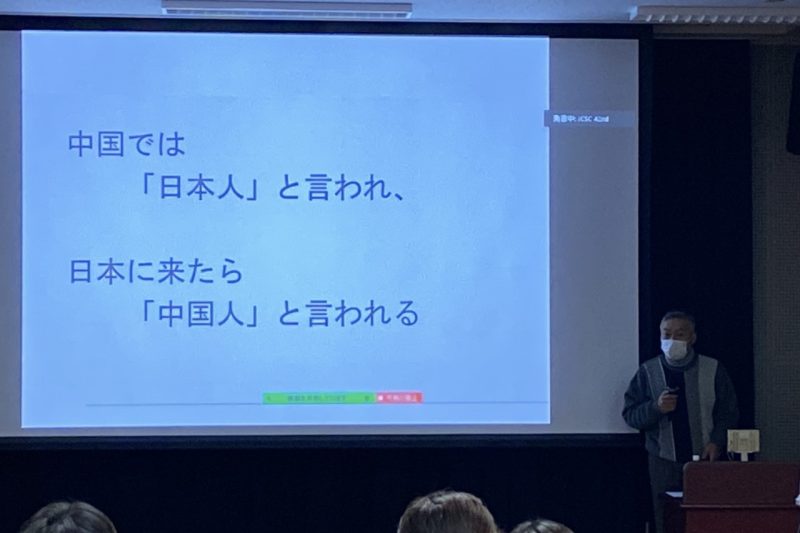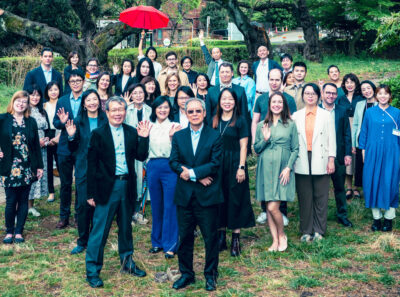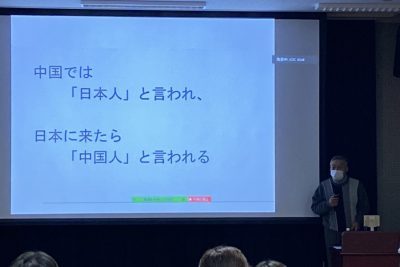Japanese orphans left behind in China: A discussion about colonialism and self-identity

This blog post was created as part of the interdisciplinary zengaku seminar "Who am I? An introduction to identity studies" offered at the University of Tokyo during the 2022-2023 academic year.
Author
NAKAI Hiromoto
2nd Year Undergraduate Student, Natural Sciences II, College of Arts and Sciences Junior Division, The University of Tokyo
They are Japanese people from “gaichi,” the “outer lands.” They are immigrants from “naichi” or the mainland Japan to “gaichi,” and then again from China to Japan. They were separated from their parents twice, once after the war ended and again after they left for Japan.
‘You must have known that this orphan belongs to our enemy. Why did you adopt him?’
‘He cries outside my house. Chinese or Japanese, their crying is the same. He didn’t speak Chinese, Japanese, or Korean. He cries. I cannot leave a crying baby outside.’
— A conversation between a news reporter and a Chinese mother (translated from Chinese)1
Why are you Japanese? How do you prove that you are Japanese? Orphans have to answer, have to show enough valid evidence to Chinese officials and to the Japanese government. In what language do orphans communicate? Chinese. Not the standardized variety of Mandarin—a Northern Chinese dialect. Without the Japanese language, how can Japanese people prove that they are indeed Japanese?
The war ended in 1945, and diplomatic relations between China and Japan resumed in 1972. That was a twenty-seven-year rift between the two nations. In those twenty-seven years, a civil war was fought between the nationalist and communist parties, the Great Leap Forward starved and penalized tens of millions, and the Cultural Revolution stigmatized those with foreign roots, revealing the backgrounds of many Japanese orphans.
Orphans know themselves to be Japanese people raised by Chinese families. What orphans don’t know is where and who their Japanese parents are. Their parents could be dead on the battlefield, or they could have long since fled and returned to Japan. Being children of colonizers, orphans endure stigma and unreasonable discrimination. Those in China want revenge, want to punish the sons of their oppressors. After all, descendants of the defeated are often the weakest and the most resented.
Though this essay is centered on Japanese orphans, I would also like to touch on the term “Japanese women left behind in China” (Chūgoku zanryū fujin) and draw a distinction between it and the term “Japanese orphans left behind in China.” (Chūgoku zanryū koji). When the Second World War ended, Japanese people aged 13 years or older that were left behind in then-Manchuria were considered “Japanese women left behind in China”; if that person was less than 13 years old, they were a “Japanese orphan left behind in China.”2 Most of those categorized as “Japanese women” are female—teenage girls were in demand among unmarried Chinese villagers, so Japanese teenage girls would be married off in the northeastern countryside, but teenage boys were viewed as useless, defeated enemies, and thus were mostly killed. Yet still, a few Japanese teenage boys managed to survive, so the term “Japanese women” actually includes both teenage boys and girls. Notably, “Japanese women” usually have higher Japanese proficiency than “Japanese orphans,” since “Japanese women” have graduated from Japanese elementary schools and their native tongue is Japanese.
Once China and Japan resumed diplomatic relations, “Japanese women” were able to return to Japan much more quickly than “Japanese orphans,” as older “Japanese women” can usually provide more credible evidence to showcase who they are.
Conversely, in only a few cases have orphans been able to remember their original Japanese name and where their hometown is. Aside from those lucky few, orphans have been often unable to find their birth family, and the possibility exists that their family may all be dead in Manchuria. As such, in order to return to Japan, most orphans needed the assistance of NGOs or third-party guarantors (who are sponsored by the Japanese government) to search for their parents or other relatives.
Orphans must fulfill ALL 5 criteria before they can request official support for finding their families.
- He/she must have been born to Japanese parents, regardless of status in the family register;
- He/she must have been separated from birth parents, or lost his/her birth parents to death, after August 9th, 1945 (first day of Soviet-Japanese War), in Northeastern China;
- He/she must have been under 13 years old when World War II ended;
- He/she should have no knowledge of where they are from;
- He/she must have been raised in China.
— Support Center for Japanese Orphans and Women Left Behind in Manchuria. April, 2022 Version. (translated from Japanese)3
To find their Japanese families, orphans must justify that they were born to Japanese parents, yet they also must not know where they are from. How can someone who doesn’t know the details of their birth know for sure whether they were born Japanese?
Furthermore, those classified as orphans were under 13 years old when the war ended, meaning that their parents left them at a fairly early age. This means that likely before they were able to acquire the Japanese language, they were adopted and brought up in rural Chinese villages. Without Japanese, how can a Japanese person justify that they are Japanese?
Among the 2557 orphans who returned to and now permanently reside in Japan, 1104 orphans fortunately found their birth parents or other relatives.4 On the other hand, 1453 orphans were unable to find their families, and yet still the Japanese government certified that they are truly Japanese.4 Without the Japanese language, a Japanese person can prove their identity through their birth parents or other relatives—otherwise, how else can they justify themselves?
Orphans are Japanese—obedient, well-behaved children of Japanese colonizers who agreed with the national immigration scheme to Manchuria. Not all orphans speak Japanese, the language that often constitutes self-identity in most circumstances. Not all orphans are able to find parents or other relatives in Japan. What constitutes orphans’ identity is much more than their families or Japanese language proficiency. For example, when babies were born to Japanese parents, they were vaccinated. Traces on the skin left behind by those vaccinations differentiate those born to Japanese families from those born to Chinese parents, allowing orphans to be certified as Japanese if they carry those skin traces.5 Additionally, human trading is not rare in rural villages, and Chinese villagers would buy “Japanese orphans” for labor and “Japanese women” to serve as surrogate mothers. Records were left, and so the entire village knows that these “Japanese orphans” and “Japanese women” are not Chinese. After China and Japan resumed diplomatic relations, Chinese officials used human trading records as evidence to identify who is truly Japanese; during the Cultural Revolution, “Japanese orphans” and “Japanese women” were denounced and stigmatized. Every family has a skeleton in the cupboard, yet no ugly history could be hidden during Cultural Revolution. Some Japanese people and their Chinese adopted families were sent to jail and physically punished because of their foreign and non-communistic roots. They were punished for being Japanese and for helping someone who was Japanese. If by chance they were not actual descendants of yamato people, they could show valid evidence (birth records or family register) to avoid being penalized. Yet, “Japanese orphans” cannot. “Japanese orphans” don’t have birth records to showcase they were born to Chinese parents. Some “Japanese orphans” do end up being punished for being Japanese. In order to educate others and to defend communism, the ‘guilty’ must be denounced in public, and entire village or entire neighborhood knows whom is penalized and for what reason. After 1972, Chinese officials were able to track down some “Japanese orphans” by their penalization history or prison records.
Among 2818 “Japanese orphans,” 2557 orphans now permanently reside in Japan.4 For orphans who were fortunate enough to find their family and whose family is willing to graciously take them in, after returning to Japan, they live with and receive assistance mainly from their family. For orphans who don’t have or cannot find family in Japan, or for orphans whose family is not willing to take them in, they were connected to NGOs and groups of guarantors around the nation, which scattered them to different prefectures around the country. While orphans who reside in larger cities like Tokyo, Osaka, Nagoya, or Nagano (though not a large city, Nagano sent the most people to Manchuria, so many “Japanese orphans” reside in Nagano) could form a community, orphans who are in more secluded, rural areas could not. That is, no shared identity inside a community could be formed. Rather, orphans need to mingle with local Japanese in small cities. Yet, the orphans’ Japanese proficiency — after only 6 months of intensive Japanese language courses — does not allow them to communicate freely with locals.
‘She said that when she came back to Japan it was already too late for her, there was no place for her there. She only wished that the children would learn Japanese, and find their place… The people who had returned from China became the poorest people, and those most subject to prejudice… She spoke of a fellow villager from Shironami who had come back from China: his children were beaten up at school every day, and their classmates called them Chinks. Just as he had been called a Jap devil by his Chinese classmates in his youth.’
—— Little Aunt Crane, a Chinese novel by Geling Yan, translated by Esther Tyldesley 6
In China, orphans are denounced and may have been imprisoned for being Japanese; in Japan, orphans are subject to prejudice and discrimination. Orphans can hardly be employed in Japan, since they are old, inexperienced, and speak only limited Japanese. They are spread out, lack the ability to communicate inside the community, and locals often don’t know the story of the orphans and what they have suffered. They end up alienated in both China and Japan.
According to a questionnaire conducted in the Kanto region, only 10% of ninety-one university sophomores had studied about “Japanese orphans” and the colonial period of Manchuria at school.7 Hence, the term “Japanese orphans left behind in China” has a fairly low degree of name recognition among general Japanese people. The identity of the orphans is questioned by both Chinese and Japanese people, with Chinese people denouncing them for being Japanese and Japanese people mocking them for being incommunicable “Chinese people.” Their identities become trapped in a negative loop in which they cannot answer the simple question “where are you from.” Based on the survey results above, even if orphans talk about being “Japanese orphans left behind in China,” almost no one in Japan would know their stories.
One could say it’s their fate, in a way: “Japanese orphans” were born to the wrong families in the wrong historical period of time. But “Japanese orphans” don’t believe in fate. They have realized that Japan — as a nation — is responsible for their identity crisis and have demanded new legislation. Orphans have sued the Japanese government. Out of 65 plaintiffs, 61 won their lawsuits, and 468.6 million yen was paid to the 61 orphans, while 4 orphans’ appeal was overruled because their appeal unfortunately exceeded the 20-year statute of limitations.8
Seventy-eight years after the end of World War II, many of the issues created by the war remain unresolved. The identity crisis that burdens the orphans can only be ameliorated by funding and related policy, but these will never be a cure. Their homeland is full of people who don’t understand their stories. Why are the stories about Japanese immigrants to the “outer lands” not taught in every school just as the events at Hiroshima and Nagasaki are? Orphans are now elders. We must reflect on and record Japanese orphans’ history while these elders are still with us. Though their legal appeal has become invalid, we must never forget about orphans’ existence and the lessons that history has taught us.
Bibliography:
- Beijing Youth x Liangzi Talk. “ ‘Under the Sky, All Babies Cry the Same’|Interview to Saikai No Nara’s Director Peng Fei.” Bilibili, 17 Mar. 2021, https://www.bilibili.com/video/BV1Pz4y1279D/?spm_id_from=333.337.search-card.all.click&vd_source=36db43b7903d4d0ef33386b1d2da02ea. Accessed Jan 20th, 202
- NPO法人 中国帰国者の会 「『中国残留邦人問題』とは」 http://www.kikokusha.com/zanryu.html (2023年1月20日最終アクセス)
- 厚生労働省社会・援護局 援護企画課 中国残留邦人等支援室「令和4年度中国残留邦人等支援に係る担当者資料(説明資料)」pp.2 https://www.mhlw.go.jp/content/12100000/000637630.pdf (2023年1月20日最終アクセス)
- 厚生労働省社会・援護局 援護企画課 中国残留邦人等支援室「令和4年度中国残留邦人等支援に係る担当者資料(参考資料)」pp.96 https://www.mhlw.go.jp/content/12100000/000637631.pdf (2023年1月20日最終アクセス)
- TBS NEWS「両親の顔も知らない・・・中国残留孤児 言いたかった『ただいま』」https://www.youtube.com/watch?v=wfS1cch88DQ (2023年1月20日最終アクセス)
- Yan, Geling. Little Aunt Crane. Penguin Random House UK, 2015.
- 山崎哲 (2022)『中国帰国者の歴史をめぐる継承ーマスメディアと三世』 https://www.ritsumei.ac.jp/file.jsp?id=541014 (2023年1月20日最終アクセス)
- 日本共産党 「中国『残留孤児』 国に責任/神戸地裁 賠償命令 帰国や自立支援怠る」. 2006年12月2日 https://www.jcp.or.jp/akahata/aik4/2006-12-02/2006120201_03_0.html (2023年1月20日最終アクセス)
Photo: Jan. 28th, 2023, Taken by the 42nd Japan-China Student Conference Committee, Mr. IIJIMA Harumitsu / Lecturer. The 42nd Japan-China Student Conference Committee. “Event Report.” Second Page. Instagram, Feb. 1st, 2023, https://www.instagram.com/p/CoHQhaPMfIW/. Accessed Mar. 14th, 2023.








